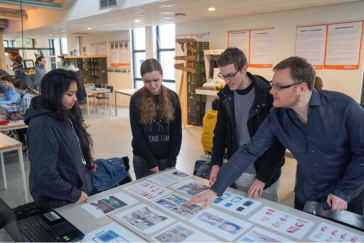Many virtual and alternate reality projects create narrative experiences in the digital medium. These are Interactive Digital Narratives (IDN), a form of expression at the intersection of different artistic approaches, research fields (humanities, computer science), and emerging technologies (e.g., artificial intelligence, virtual reality, generative content), with a wide potential for different applications. A key element towards fulfilling this potential is the creation of a satisfying user experience. In this paper we present a toolbox for the evaluation of the user experience that connects which enables the systematic and quantitative study of IDN user experiences.
Postdoc research project Transformation through Interactive Narrative DesignMedia psychologist dr. Christian Roth's postdoc project Transformation through Interactive Narrative Design (TIND) is part of the Professorship Performative Creative Processes, the school Games & Interaction, and the Expertisecentrum Onderzoek, Innovatie en Internationalisering (OOI). Here, Christian interweaves education and practice-oriented research. He studies the artistic, pedagogical and academic perspectives regarding the power of transformation through applied Interactive Narrative Design (IND).Within the two-year postdoc research project TIND, Christian studies the training of interactive narrative designers with the goal of developing teaching methods and learning tools for artists and designers, such as game and interaction designers, to enable them to create more effective artefacts.Why interactive narrative design?IND offers agency, defined as the ability to influence narrative progression and outcomes in a meaningful way. As such, it carries the potential to create and emotional impact and spark transformative change. This enables interactors to explore different points of view and to feel the weight of their own choices and consequences. This, in turn, allows for a more thorough understanding of complex multi-stakeholder issues, which could have a significant impact on the success of emerging artistic, and learning applications.The TIND project will enable designers through an interdisciplinary approach, including applied game design, immersive theatre, behavioral and cognitive psychology, and the learning sciences.A good example for offering different perspectives on a complex topic is the narrative simulation Mission Zhobia: Winning the Peace, which is used for the training of peacekeepers. Or the news game, I am Mosul, which aims to raise awareness around the effects of war by bringing it close to home: choose your Dutch city and make choices on how to survive if the war was there. And the interactive story Adventures with Anxiety offers a new understanding by letting interactors play anxiety embodied within a wolf. IND is a complex and challenging interdisciplinary field in which design knowledge from other media can often not be directly transferred. As a new medium, it introduces new affordances in technique and user experience. This requires practice-based research for further development of the educational format, demonstrating its potential while identifying and overcoming common learners’ challenges. This project aims to develop a framework for the design and evaluation of meaningful interactive narrative experiences that effectively stimulate a variety of cognitive and emotional responses such as reflection, insight, understanding, and potential behavior change. It provides tools, methods and activities to enable aspiring or practicing narrative designers through an interdisciplinary approach, including game design, immersive theatre, behavioral and cognitive psychology, and the learning sciences.HKU education means to prepare students for success in the creative industries and IND plays an important role for current and future jobs in education, arts and entertainment. IND has the potential to create an emotional impact and spark transformative change by offering agency, defined as the ability to influence narrative progression and outcomes in a meaningful way. This enables interactors to feel the weight of their own choices and their consequences, to explore different perspectives, and to more thoroughly understand complex multi-stakeholder issues, which could have significant impact on the success of emerging artistic, and learning applications.The planned output is a collection of design tools and methods for interdisciplinary workshops and courses, which can be integrated into different curricula at the HKU, thereby enhancing existing programs while enabling the refinement of training methods. Once completed, this postdoc project delivers a training method with multiple applications designed to harness the power of interactive storytelling for transformative personal and societal impact.ColloborationsThe research project is directly embedded in the curriculum of the HKU schoolGames & Interaction with annual educational offerings such as the Minor Interactive Narrative Design (MIND) and HKU wide broad seminars. Course evaluation and literature research will be used to create new and adjusted training for different HKU schools and the industry.More informationAre you interested to learn more about the postdoc research project Transformation through Interactive Narrative Design? Get in touch with Christian Roth: christian.roth@hku.nl
